- Home
- Captain W E Johns
01 Kings Of Space Page 4
01 Kings Of Space Read online
Page 4
While the Professor was out of the room Rex walked round trying without success to make sense of sketches, blueprints, and sheets of incredible chemical and algebraical formulae that lay about. It was plain that, as his father had said, if the Professor was not insane he was one of that exclusive school of scientists whose highly specialized brains are so far ahead of those of ordinary people that they live in a little world of their own.
The Professor came back just as Judkins arrived to say that breakfast was ready.
'I seem to remember some talk of building refuelling stations in space,'
remarked Tiger, as they went through to the dining-room and seated themselves at the table. It sounded pretty far-fetched to me.'
'Not at all — not at all,' returned the Professor. 'It's an ingenious and quite feasible plan, although in my opinion a clumsy one. It might work for Moon travel, but hardly for interplanetary flight, which would involve long periods of time. The idea is by means of manned rockets to build a platform, with refuelling facilities, in a prearranged orbit. It would be quite possible at a distance of about 24,000 miles from the Moon, which is the point where the gravities of the Moon and the Earth neutralize each other. There would then be no need for a spaceship to carry with it all the fuel required for a journey to the Moon and back.
That, in terms of aviation, would be like a transatlantic plane having to take with it enough petrol for the return journey. A spaceship, on its outward journey, could drop off drums of fuel at intervals and pick them up on the return trip. They'd still be there. Of course, the idea of leaving heavy objects floating about in space isn't easy to grasp by people who have always supposed that everything must fall. That only applies while one is in the gravitational field of the Earth. Once out of it, as I said just now, an object, even a lump of lead, has no weight. In simple terms, the farther an object gets from the Earth the less it weighs. Perhaps even more difficult to grasp is the idea that a body, having reached a certain height, instead of slowing down will suddenly go faster.
That is because it will then be falling towards the Moon — falling up to it or down to it, whichever you prefer. The problem then will be to check the fall, otherwise the ship, falling free, would crash into the Moon at 5,000 miles an hour. Not that that would be any worse for travellers than crashing into it at a hundred miles an hour.'
Could you miss the Moon altogether?' inquired Rex. 'I mean, go right past it?'
The Professor looked at him over his glasses. Oh yes. But that wouldn't worry me. I should simply accelerate to a speed that would take me back into the gravitational field of the Earth, towards which I should then begin to fall. Marvellous thing, gravity. As you know, it's the gravitational pull of the Moon that causes the tides. If the Moon came any nearer it would pull the seas clean out of their beds and flood the land.'
In short, this Moon project seems to depend almost entirely on the use of gravity?' put in Tiger.
'As far as a rocket is concerned, it would be quite impossible to get to the planets except by the employment of orbital velocity, which is the result of gravity.'
'What do you mean by orbital velocity?' asked Rex. 'Is it the place where the different gravities cancel themselves out?'
'Oh dear no. In astronautics we talk of escape velocity and orbital velocity. The first is a speed that will actually free us from the gravitational pull of the Earth. Orbital velocity wouldn't do that. A spaceship could only remain in a circular orbit while it had the necessary speed. Should the speed fail the ship would fall. Let us put it like this. If an object travels fast enough it can't fall. That is to say, gravity can't pull it down, because centrifugal force is pulling it up at the same time. Take a rifle bullet. If you drop one, having no speed, it falls. But at muzzle velocity, the speed at which it leaves the rifle, it doesn't fall. If it were not for the resistance of the air slowing it up, it never would fall. It would go round and round the world at the same height for ever and ever. But as air resistance slows it, it presently drops to a speed when gravity can pull it down. The farther from the earth the less the gravitational pull, so less speed is required to keep it in space. Thus, at a certain height above the Earth, having given my machine the necessary speed, I shall be able to switch off all power and just go sailing on for as long as I please.
There will be no head resistance to stop me because I shall be outside the atmosphere.
The Moon is sitting in an orbit. So are we, going round and round the Sun. The same thing is happening to all the other planets and their moons. And finally, the whole Solar System, complete with the Sun, is whirling round in the Universe. We are all riding on a wonderful merry-go-round, travelling at unthinkable speeds yet without any sense of movement.
Rex shook his head. 'You know all about these things.'
The Professor's eyes twinkled. Ìf I set off for the Moon without having some idea of what's likely to happen, I'd soon be in trouble. If I can survive my first trip I shall know even more about it. But if everyone has had enough to eat, let's go and look at the ship that is going to sail these unknown seas of space.'
They got up, Rex wondering what they were going to see.
A short walk along a corridor brought them to a flight of concrete steps which ended in what might best be described as a small square hangar, set between the sloping sides of a deep gorge. The far end of the building was open to the air and the concrete floor continued on some distance into it. An indescribable amount of sheet metal and other debris lay around benches, carrying lathes, presses and other machine-tool equipment.
To these things Rex paid little attention, for his eyes had gone straight to a strange-looking object, obviously the Space-master, which occupied the centre of the building. It was about twenty feet high by twenty in diameter, and it was at once clear why the Professor had likened it to a flying basin; for if it resembled anything it was a huge inverted metal bowl mounted on a cylindrical base and supported by a chassis consisting of six legs, equally spaced and spread outwards, resting on small metal balls. The top of the bowl was dome-shaped, but it was not plain sheet metal. It appeared to be built up of blades set close together, something like the petals of a daisy flower with the petals half twisted. Between this structure and the lower drum, small portholes of heavy glass indicated the position of the cabin. Some distance below this a number of nozzles projected.
Well, there it is,' announced the Professor, a touch of pride in his voice. 'A good many years' work has gone into it. Like all prototypes it had its teething troubles.' He glanced at Tiger. Nothing in common with your orthodox aircraft; but as their purposes are entirely different one would expect that. Wings are useless if there is nothing to support them.
You can just
see the bottom of the rudder, inset vertically in the exhaust thrust just below the nozzles.
So far I have found nothing better to withstand the heat than the graphite used by the German V.2 rocket. But perhaps I had better explain the general principles.' The Professor popped a caramel into his mouth.
Tiger filled his pipe.
'When I first carried my study of astronomy into the field of interplanetary flight,'
continued the Professor 'it did not take me long to decide that the idea of employing a motive power dependent on fuel was out of the question.
The standard space rocket of today burns liquid fuel at the rate of nearly three hundredweight a second. It might be possible eventually to crash such a ship on the Moon, which is what a rocket would do if it went through escape velocity without sufficient fuel left to break its fall.
Alternatively, it would crash on the Earth — which every rocket so far has done. For as I believe I told you, just as much fuel would be needed to break the fall as would be needed to get clear of the Earth. Even if a rocket managed to land on the Moon, what about getting back? No one would willingly maroon himself on the Moon. It was this problem, of course, that resulted in the scheme for a refuelling station in space, which we discussed. I went to w
ork on different lines. What obviously was needed was a form of energy that could be produced or generated in flight. In other words, fuel in unlimited supply. Without such a source of power it was to me quite futile to talk of getting to Venus or Mars, our nearest neighbours. Given an inexhaustible motive power interplanetary flight would at once become a comparatively simple project. One could travel in a straight line instead of wandering hundreds of thousands of miles out of the way seeking orbits. But what form of energy could be found in a vacuum, an absolute vacuum if we ignore sub-atomic particles such as photons and electrons? Only one thing. Cosmic rays. There would be no need to store them for they occur everywhere, in everything. Don't ask me what they are because I don't know. Nobody knows. But I have managed to —
I won't say harness them — turn them to my purpose. By magnetized sodium discs, which I can open or close at will, I can attract them and concentrate them so that in their frenzy to escape they pour through diminishing jet nozzles below the machine and give me the required thrust. The discs are closed now, but you can see the circular lines.
Strictly speaking they're not discs, but inverted cones that open and close in the manner of the diaphram in a camera. The discs are in series which can be employed independently to maintain equilibrium, or, if necessary, provide the cabin with artificial gravity.'
'Artificial gravity?' questioned Tiger, looking incredulous.
'Yes. Quite simple. A gyroscope keeps the whole thing steady, but by revolving the cabin gravity is created in the opposite direction.
Normally I shall be anchored to my seat, as will be everything else if it is not to drift about. The rest was comparatively easy. For movement through the atmosphere, or anywhere where there is air, in order to ensure absolute control when landing I have installed two sets of rotor airscrews, one above the other and turning in opposite directions to counteract torque that would otherwise develop at high revolutions. Call them auxiliary to the main power. As you can see, they form the dome, and are no more than a development of the well-known autogyro principle.
Below, you see the portholes of the cabin, darkened to combat the ultra-violet rays at high altitudes that might otherwise burn the skin. Air I shall take with me in liquid form to maintain the necessary pressure. As a helicopter the machine behaves perfectly.
I'll show you. Judkins I'
'Sir.' The butler appeared like magic.
'Stand by for Test Alpha!'
'Yes, sir.'
To Rex's surprise Judkins had only to put a hand against the Spacemaster to move it without effort to the open concrete apron.
'Won't this power unit of yours generate a lot of heat?' asked Tiger.
'Yes, I think it may. But I've introduced a thick layer of insulating material between it and the cabin,' answered the Professor. 'Come in,' he went on, mounting the short ladder that gave access to the entrance panel.
They went in, the door closing noiselessly behind them on hermetically sealing rubber flanges.
This is what I want you to look at,' said the Professor to Tiger, tapping the wall. 'It's one-eighth-inch steel, reinforced. As you will know, the atmospheric pressure at sea level is fifteen pounds to the square inch, which means that every square foot of the cabin wall is subject to nearly a ton weight. With pressure equal on both sides that is immaterial; but with such pressure from within only, as would be the case in a vacuum, the ship might burst open were the walls of insufficient strength. In actual practice the strain need not be as great as that. The human body is wonderfully adaptable, otherwise people would not be able to live in the rarefied air of mountainous countries. What do you think of my welding? Unless I am to lose pressure it must be perfect. I have been a little concerned about it and would be glad to have your opinion. I suppose I should have got a skilled man to do it, but had he talked afterwards it might have resulted in distasteful publicity.'
Tiger went over the joints of the panels with great care. 'A little rough in places but otherwise perfectly sound,' was his opinion. I don't think you need worry about that.'
Good. You relieve my mind,' said the Professor. 'The question of pressure is, of course, tied up with air to breathe. It will be carried in liquid form. No difficulty about that. But the question of how much will be required for journeys of varying lengths was a complex problem. The air we breathe normally is composed of one-fifth oxygen, which is the gas we actually need, and the rest nitrogen, which as far as we know is no use to us. I daren't risk trying to live on pure oxygen, so I have compromised with an equal mixture of oxygen and nitrogen, which should be safe. The next question was what to do with the carbon dioxide into which this would be converted by breathing. Rather than dispose of it I found it more advantageous to convert it back to oxygen with sodium hydroxide —
the job done for us on earth by the vegetation. But we can discuss these technicalities in the study.'
Rex had been gazing round the cabin. Whichever way he looked he was confronted by instrument dials, some large, some small. There was also a good deal of equipment visible, cylinders and the like, as well as devices the purpose of which he could not guess. His inspection ended when the Professor seated himself in a heavily padded chair within reach of a control table carrying numerous levers and switches.
Judkins took up a position, in a similar seat, behind a wheel of some size, in the manner of a helmsman of a ship.
'Gravity one,' called the Professor.
'Gravity one,' echoed Judkins, giving the wheel a quarter turn.
'Contact.'
'Contact, sir.' Judkins advanced a lever.
Overhead something began to hum with a deep vibrant note, but there was no sensation of movement.
The Professor swivelled in his chair. 'By the way, we don't talk of speed in space,' he explained. 'We speak of it only in terms of gravity — so many gravities.'
Rex, looking through his porthole, saw with astonishment that they were already airborne. They were about ten feet clear of the ground and still rising.
'Cut!' called the Professor.
'Cut.'
The drone began to die.
'Gravity two.'
'Gravity two, sir.'
The drone began again, this time with a far more powerful note, and from below.
'We are now on the cosmic jets,' explained the Professor. Looking down Rex saw the Earth dropping away below. Stop!' ordered the Professor.
Stop.'
The roar died to a whisper and the Earth came up to meet them.
'Hold at plus ten,' ordered the Professor.
'Plus ten,' echoed Judkins.
The Professor rose smiling. 'Nice and steady, isn't she? That's due to the gyroscope of course.'
'Incredible,' was all that Tiger could say.
'Merely a matter of energy. With unlimited power one can do anything. We are now on the cosmic jets at one-twentieth exposure. At full exposure you would be travelling at not less than twelve gravities, which in terms of speed would be very fast indeed. All right, Judkins. That's enough.
We'll go down now.'
With the slightest perceptible bump the Spacemaster returned to Earth. As Rex stepped out he noted a faint blue haze coming from under the machine.
He jumped as a little of it came his way, and touching his skin created a sensation of pins and needles.
The Professor smiled. 'Only exhausted cosmics. They won't hurt you,' he said cheerfully.
He turned to Tiger. Well, what do you think of the Spacemaster?'
'I haven't words to tell you,' answered Tiger helplessly.' It's all too incredible.'
'I'll show you how she responds to remote control,' said the Professor.
'Close the door, Judkins.' He led the way to a switchboard just inside the hangar. 'Watch!'
In a flash the Spacemaster had shot up to two hundred feet, level with the top of the gorge, where it remained stationary.
'I won't send her any higher for fear she might be seen from outside,'
remarked the P
rofessor.
All Rex could do was stare. The exhibition, he thought, was taking on the character of an optical illusion. The Spacemaster came slowly back to Earth.
I think you will agree, Group Captain, that my ship is in advance of anything in the helicopter group,' claimed the Professor.
'There's nothing in the world like it,' declared Tiger. 'How high have you been in it?'
'Not far. A few hundred miles when there was continuous cloud cover.' The Professor smiled roguishly. I've always been afraid of being seen by some garrulous deer-stalker, who would have such a tale to tell that my work might have been interrupted by inquisitive spectators. I really went up to get some photographs of the Moon, clearer definitions than is possible from sea level. I've had some minor problems. Heat control was somewhat awkward. I was also troubled a little by the so-called radio rays shot out from the Sun. These are the rascals that sometimes interfere with wireless reception. Yes, there were a lot of things to think about. I couldn't afford to forget anything.'
`No, I can see that,' answered Tiger drily. `To say that I'm shaken is to put it mildly. The work I've been doing is child's play to this.
Congratulations, Professor.'
'Thank you.'
Rex stepped in. 'Will you have to wear special clothing?'
'For landing on the Moon, yes, but not for the preliminary flight. I've had to devote a lot of thought to personal equipment, such as cosmosuits
- as I call my special clothing. I have also devised pressure pads for the pulses to keep the blood steady during early acceleration.'
'When are you thinking of making your first really high reconnaissance?'
asked Tiger.

 Biggles in the Underworld
Biggles in the Underworld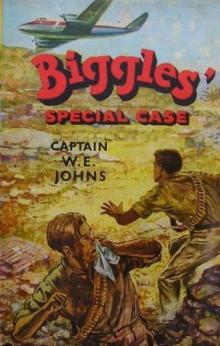 Biggles' Special Case
Biggles' Special Case 34 Biggles Hunts Big Game
34 Biggles Hunts Big Game 03 Now To The Stars
03 Now To The Stars 55 No Rest For Biggles
55 No Rest For Biggles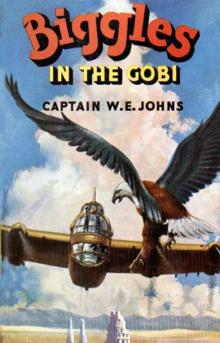 46 Biggles in the Gobi
46 Biggles in the Gobi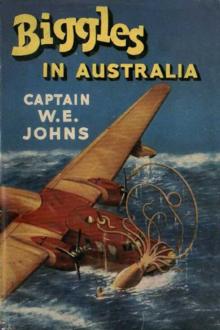 52 Biggles In Australia
52 Biggles In Australia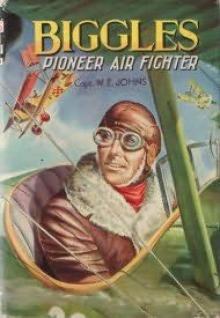 51 Biggles Pioneer Air Fighter
51 Biggles Pioneer Air Fighter 05 Biggles Flies East
05 Biggles Flies East 28 Biggles In Borneo
28 Biggles In Borneo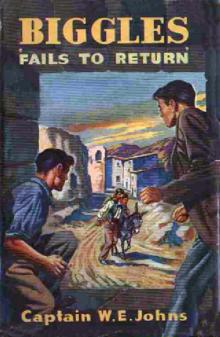 29 Biggles Fails to Return
29 Biggles Fails to Return 55 No Rest For Biggles (v2)
55 No Rest For Biggles (v2) Biggles Does Some Homework
Biggles Does Some Homework Biggles of the Camel Squadron
Biggles of the Camel Squadron 35 Biggles Takes A Holiday
35 Biggles Takes A Holiday Biggles And The Black Peril (06)
Biggles And The Black Peril (06) 17 Biggles And The Rescue Flight
17 Biggles And The Rescue Flight Biggles Learns To Fly
Biggles Learns To Fly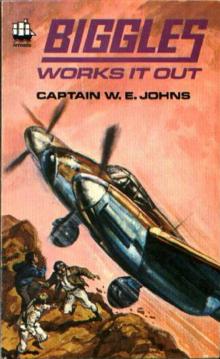 40 Biggles Works It Out
40 Biggles Works It Out 05 Biggles Learns To Fly
05 Biggles Learns To Fly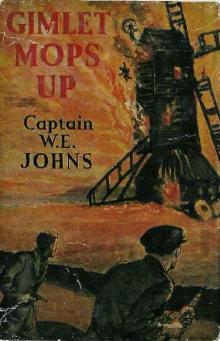 04 Gimlet Mops Up
04 Gimlet Mops Up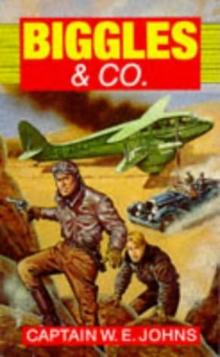 10 Biggles and Co
10 Biggles and Co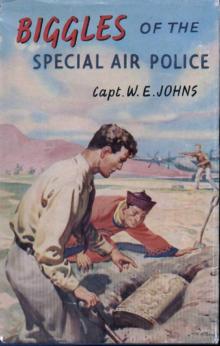 47 Biggles Of The Special Air Police
47 Biggles Of The Special Air Police Biggles and the Noble Lord
Biggles and the Noble Lord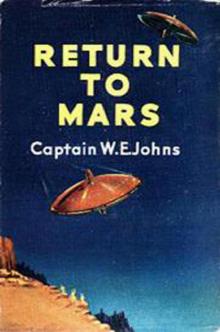 T2 Return To Mars
T2 Return To Mars 21 Biggles In the South Seas
21 Biggles In the South Seas No Rest For Biggles
No Rest For Biggles Biggles In The Cruise Of The Condor (02)
Biggles In The Cruise Of The Condor (02) 06 Biggles And The Black Peril
06 Biggles And The Black Peril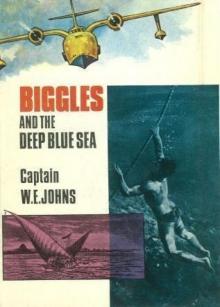 Biggles and the Deep Blue Sea
Biggles and the Deep Blue Sea 06 Biggles Hits The Trail
06 Biggles Hits The Trail 39 Biggles Goes To School
39 Biggles Goes To School 44 Biggles and the Black Raider
44 Biggles and the Black Raider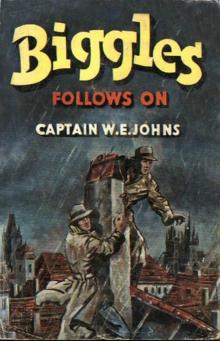 42 Biggles Follows On
42 Biggles Follows On Biggles In the South Seas
Biggles In the South Seas 21 Biggles In The Baltic v3
21 Biggles In The Baltic v3 27 Biggles - Charter Pilot
27 Biggles - Charter Pilot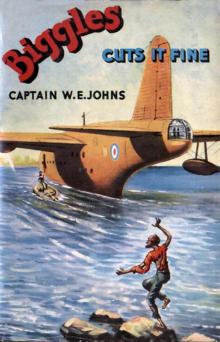 49 Biggles Cuts It Fine
49 Biggles Cuts It Fine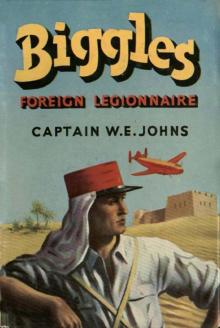 51 Biggles Foreign Legionaire
51 Biggles Foreign Legionaire 04 Biggles Flies Again
04 Biggles Flies Again 16 Biggles Flies North
16 Biggles Flies North 37 Biggles Gets His Men
37 Biggles Gets His Men 07 Gimlet Bores In
07 Gimlet Bores In 19 Biggles Secret Agent
19 Biggles Secret Agent 32 Biggles In The Orient
32 Biggles In The Orient Adventure Unlimited
Adventure Unlimited 26 Biggles Sweeps The Desert
26 Biggles Sweeps The Desert Biggles Air Detective (43)
Biggles Air Detective (43) 36 Biggles Breaks The Silence
36 Biggles Breaks The Silence 14 Biggles Goes To War
14 Biggles Goes To War 18 Biggles In Spain
18 Biggles In Spain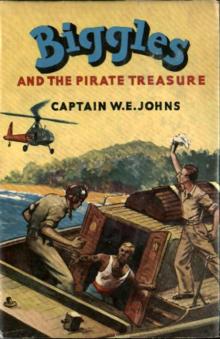 50 Biggles and the Pirate Treasure
50 Biggles and the Pirate Treasure 25 Biggles In The Jungle
25 Biggles In The Jungle 23 Biggles Sees It Through
23 Biggles Sees It Through 21 Biggles In The Baltic
21 Biggles In The Baltic 24 Spitfire Parade
24 Spitfire Parade 38 Another Job For Biggles
38 Another Job For Biggles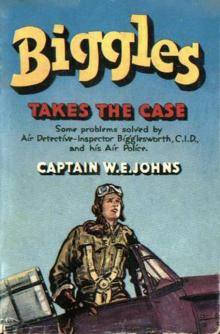 41 Biggles Takes The Case
41 Biggles Takes The Case 43 Biggles Air Detective
43 Biggles Air Detective 53 Biggles Chinese Puzzle
53 Biggles Chinese Puzzle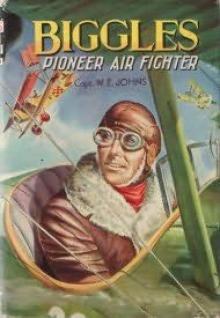 Biggles Pioneer Air Fighter (51)
Biggles Pioneer Air Fighter (51) 22 Biggles Defies The Swastika
22 Biggles Defies The Swastika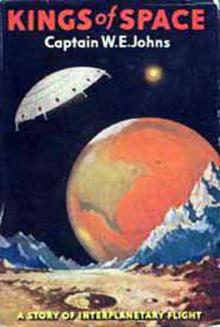 01 Kings Of Space
01 Kings Of Space